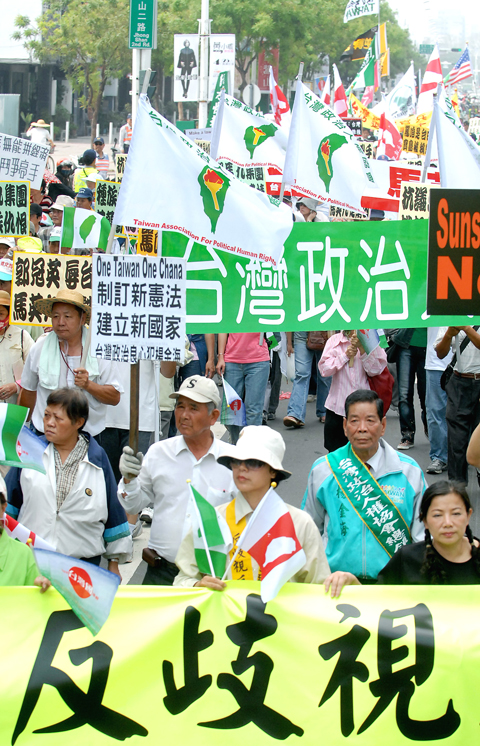President Ma Ying-jeou (馬英九) on Tuesday broke his silence on former Toronto-based Government Information Office (GIO) official Kuo Kuan-ying (郭冠英) after 14 days, condemning his online articles smearing Taiwan and Taiwanese.
Ma at the time said he hoped the controversy would end, but analysts who believe the president’s comment was too little, too late said the controversy was unlikely to end anytime soon.
After repeated denials, Kuo last week admitted that he had written the controversial articles under the pen name Fan Lan-chin (范蘭欽). The articles say, among other things, that “[China] should spend many years suppressing [people in Taiwan] instead of granting any political freedom [to them] once it has taken Taiwan by force.”

PHOTO: HUANG CHIH-YUAN, TAIPEI TIMES
Presidential Office Spokesman Wang Yu-chi (王郁琦) said a person whose remarks incited ethnic hatred should be condemned, but emphasized that Kuo’s articles had been published between 2005 and 2007, when the Democratic Progressive Party (DPP) was in power.
He also said that the controversy over Kuo’s remarks was the result of “provocation by some politicians.”
Criticizing Wang as “arrogant,” Hawang Shiow-duan (黃秀端), a political science professor at Soochow University, said Wang was implying the DPP was to blame for the articles.
Hawang said she believed there were more government officials like Kuo who have not “come out of the political closet.”
Hawang said the legislative by-election in Taipei City’s Da-an District had been among the factors contributing to Ma’s decision to come forward.
“Ma might have seen that the matter has gotten out of hand and that it was necessary for him to come out and say something,” Hawang said.
While Ma said he would like to see the controversy end here, Hawang said that whether it would end would hinge on Kuo’s attitude, pointing out that Kuo had continued to make contentious remarks in Toronto, as in an interview with ETTV on Wednesday in which he called himself a “hero.”
Chao Yung-mao (趙永茂), a political science professor at National Taiwan University, agreed that yesterday’s Da-an by-election “more or less” played a role in Ma’s comments.
Following the KMT’s defeat in a legislative by-election in Miaoli, it sought to court centrist voters and KMT sympathizers, Chao said.
The controversy over Kuo’s articles was not over, he said, because the issue would be mentioned repeatedly in elections and the investigation into the matter was not finished.
Career civil servants must remain politically neutral, Chao said, adding that Kuo would have had full freedom of speech had he not been a civil servant.
Joseph Tsai (蔡榮祥), a political science professor at National Chung Cheng University, said Ma’s decision to denounce Kuo had more to do with his own sliding approval rating.
“Most politicians are selfish. They usually do whatever is best for them. His approval rating has dropped to 28 percent, so it would be a good idea for him to do a little bit of damage control here, or he will be held responsible if Kuo continues to stir up controversy,” Tsai said.
Tsai said he believed Kuo was not the only “Fan Lan-chin” in the government.
Although Kuo was free to advocate unification with China, racist remarks could not be tolerated, Tsai said.

An essay competition jointly organized by a local writing society and a publisher affiliated with the Chinese Communist Party (CCP) might have contravened the Act Governing Relations Between the People of the Taiwan Area and the Mainland Area (臺灣地區與大陸地區人民關係條例), the Mainland Affairs Council (MAC) said on Thursday. “In this case, the partner organization is clearly an agency under the CCP’s Fujian Provincial Committee,” MAC Deputy Minister and spokesperson Liang Wen-chieh (梁文傑) said at a news briefing in Taipei. “It also involves bringing Taiwanese students to China with all-expenses-paid arrangements to attend award ceremonies and camps,” Liang said. Those two “characteristics” are typically sufficient

A magnitude 5.9 earthquake that struck about 33km off the coast of Hualien City was the "main shock" in a series of quakes in the area, with aftershocks expected over the next three days, the Central Weather Administration (CWA) said yesterday. Prior to the magnitude 5.9 quake shaking most of Taiwan at 6:53pm yesterday, six other earthquakes stronger than a magnitude of 4, starting with a magnitude 5.5 quake at 6:09pm, occurred in the area. CWA Seismological Center Director Wu Chien-fu (吳健富) confirmed that the quakes were all part of the same series and that the magnitude 5.5 temblor was

The brilliant blue waters, thick foliage and bucolic atmosphere on this seemingly idyllic archipelago deep in the Pacific Ocean belie the key role it now plays in a titanic geopolitical struggle. Palau is again on the front line as China, and the US and its allies prepare their forces in an intensifying contest for control over the Asia-Pacific region. The democratic nation of just 17,000 people hosts US-controlled airstrips and soon-to-be-completed radar installations that the US military describes as “critical” to monitoring vast swathes of water and airspace. It is also a key piece of the second island chain, a string of

The Central Weather Administration has issued a heat alert for southeastern Taiwan, warning of temperatures as high as 36°C today, while alerting some coastal areas of strong winds later in the day. Kaohsiung’s Neimen District (內門) and Pingtung County’s Neipu Township (內埔) are under an orange heat alert, which warns of temperatures as high as 36°C for three consecutive days, the CWA said, citing southwest winds. The heat would also extend to Tainan’s Nansi (楠西) and Yujing (玉井) districts, as well as Pingtung’s Gaoshu (高樹), Yanpu (鹽埔) and Majia (瑪家) townships, it said, forecasting highs of up to 36°C in those areas